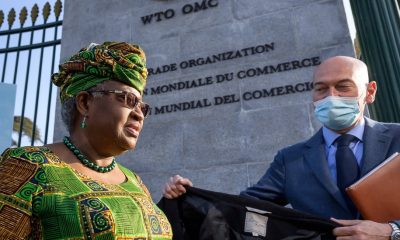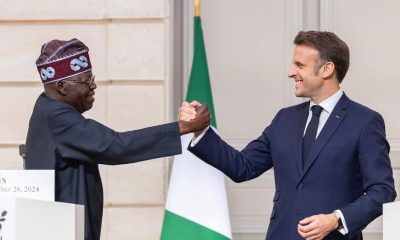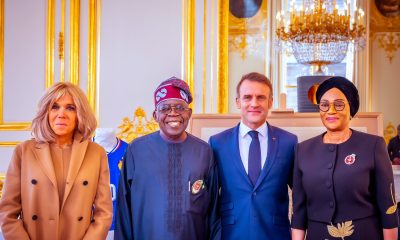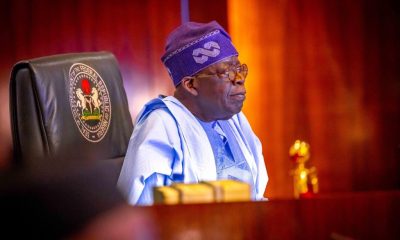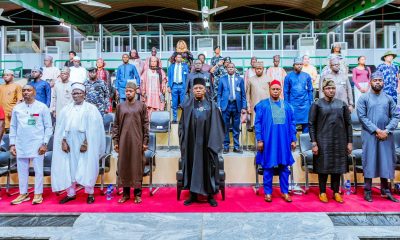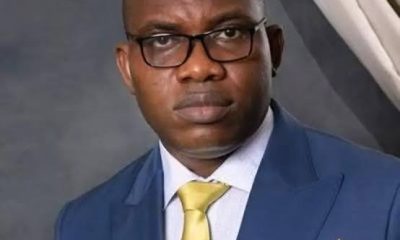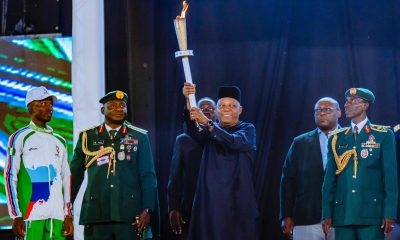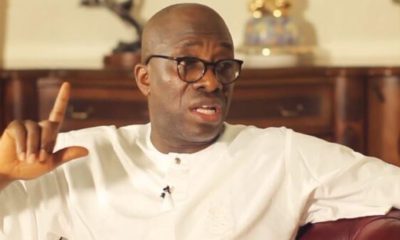News
You need Africa today more than before, Tinubu tells world leaders

President Bola Tinubu has declared that, with the abundant resources in Africa, especially in the solid minerals sector, the continent does not need to wait for aid and grants from the global community.
President Tinubu also said that, with the enormous resources in the continent, the world needs Africa today more than before.
These, among others, were contained in his keynote address at the high-level event of the Africa Minerals Strategy Group, “Africa’s Natural Resources Shaping the Future,” on Tuesday in New York, USA.
The President, represented by Vice President Kashim Shettima, said Africans have learned from the experiences of the slave trade and commodity export.
He said that the continent can see the persistence of the injustice of unequal trade relations despite the agreements between the ACP (African, Caribbean, and Pacific) countries and the European Union or the United States programme, AGOA (African Growth and Opportunity Act), or even the ongoing implementation of trade agreements.
The Nigerian President further said that it was with utmost conviction that the great people of Africa have reached a critical moment in their long struggle for social, economic, and political independence, adding, “Now is our time to seize the chance to change the narratives that have been our lot that I stand before you today to set a new agenda of transformation.”
He said the beautiful fact of Africa’s ugly past of colonial and neo-colonial exploitation was that before the continent was plundered and overpowered with the technological innovation of the gun, “our ancestors and their counterparts from Europe were friends, business allies, and mutual sovereigns.
“Africa’s merchants exchanged trade articles such as leather, gold, ivory, and palm oil for cotton, silk, gin, and mirrors.”
Citing an example, Tinubu said, “In 1485, the Portuguese, led by John D’Aveiro, established trade with the Kingdom of Benin in present-day Nigeria. According to our historical records, during the reign of Oba Esigie (1504-1550), the Kingdom of Benin established diplomatic ties with Portugal.
“Both kingdoms exchanged ambassadors, and a school for learning the Portuguese language was established in the Benin Kingdom. The cultural exchange was so engaging that Oba Esigie learned and spoke Portuguese! For most of Africa before colonisation, this was the character of the relationship between our ancestors and the white men from Europe.
“Commercial relationships led to political relationships until the visitors became greedy and upset the cordial harmony by unleashing the trans-Atlantic slave trade, the most devastating depopulation that mankind has ever witnessed.”
He said that he foresaw the resurgence of that era of commercial partnership, mutual diplomatic relations, and economic collaboration after exploiting each other, enslaving each other, and killing each other for over three centuries, noting that the world has realised the futility of hatred and the fatality of one man exploiting another.
He said that the greatest force for global unity and cohesion today is technology, as he opined that communications technology has shrunk the world into a global village and turned strangers into neighbours.
“It has dissolved boundaries and created a world without borders. Telecommuting has transformed the world of work into virtual hubs of co-creation. Wherever you turn, young brilliant innovators are raising the bar, leading the charge of progress into the smart world.
“One of the factors in this development is revolutions in battery technology. Evolution in lithium-ion technology enables the manufacturing of portable consumer electronics, laptops, computers, cellular phones, and electric cars. We live in a world of electronic mobility in which lithium-powered batteries provide higher specific energy, higher energy density, higher energy efficiency, longer cycle life, and longer calendar life.
“This development powers the global struggle against carbon emissions. It promotes a greener world that tames destructive floods and excessive heat, two consequences of global climate under pressure that millions encounter and thousands fail to survive.
“The global need for new battery technology has triggered a new scramble for Africa’s critical minerals. Africa possesses 92 per cent of global reserves of platinum, 56 per cent of cobalt, 54 per cent of manganese, and 36 per cent of chromium.
“These are the minerals employed in the manufacturing of the new batteries. In short, the world needs Africa today more than ever.
“Africans have learned from the experiences of the slave trade and commodity export. We can see the persistence of the injustice of unequal trade relations despite the agreements between the ACP (African, Caribbean, and Pacific) countries and the European Union or the United States program, AGOA (African Growth and Opportunity Act), or even the ongoing implementation of trade agreements.
“Whenever and wherever we accept the age-old role of supplier of raw materials to global industry, we end up with the short end of the stick.
“Our people don’t want to wait for your aid and grants anymore. A situation in which the raw minerals are extracted from our countries, exported, refined, and sold to us as finished products merely consolidates the foundations of our misery and pushes us further down the depths of underdevelopment.
“We seek to break free by localising the whole mineral value chain from extraction to processing to sales within our countries. We have skilled men and women, talented graduates in any discipline you desire, with immense capacity to learn and innovate.
“We have put in place policies to promote direct foreign investment and ease the repatriation of profits; we have introduced tax holidays and incentives for the importation of machinery and migration of professionals with expertise and experience.
“The governments in Africa are working day and night to improve the ease of doing business. We are improving our energy, transportation, and housing infrastructures and facilities. We are simplifying our business rules in line with international best practices, and we are containing threats to security, law, and order.
“Specifically, my administration has adopted the principle of local value addition as conceived by the Africa Minerals Strategy Group, chaired by Nigeria’s Minister of Solid Minerals Development, Dr. Oladele Alake. Key to this strategy is attracting companies involved in manufacturing lithium batteries, concentrates, and components to set up their businesses and domesticate the value chain from extraction to production in Nigeria.
“With over 226 million hardworking, fastidious subscribers, we offer an immediate market for local purchases and international exports. This has been demonstrated by the boom in the 10 billion dollar telecom market in our country, manifesting an internationally competitive annual growth of 5.20% per annum.”
He highlighted alarming statistics from the United Nations Development Programme, revealing that over 328 million people in the poorest countries are in dire need of humanitarian assistance.
He stated, “Poverty worsened for the first time in two decades, particularly for low-income and middle-income earners,” underscoring the urgency for transformative strategies.
In his address, the Chairman of the Africa Minerals Strategy Group and Nigeria’s Minister of Solid Minerals, Dr. Henry Dele Alake, proposed a paradigm shift from merely exporting raw minerals to processing them locally into finished goods.
He defined local value addition as transforming raw minerals into semi-finished or finished products, which would enhance capital formation and create jobs across Africa.
He said, “By moving from commercialization to industrialization, we can significantly raise the contribution of the solid minerals sector to our GDP.”
“The initiative has already gained traction, with ten new mineral processing projects underway in Nigeria focusing on lithium, gold, bauxite, and other valuable resources.”
He called on African leaders to unite in this endeavour and urged global mining companies to partner with African nations to foster industrialization in the solid minerals sector.
“We seek to localise the entire mineral value chain from extraction to processing within our countries,” he said.
He said that the initiative represents a unique opportunity for Africa: “This is our chance! Together, we can transform our continent from suppliers of raw minerals to equal partners in the global mining industry.”
Secretary-General Moses Engadu, at the inaugural high-level roundtable of the Africa Minerals Strategy Group (AMSG), stressed the vital role of Africa’s natural resources in shaping not only the continent’s future but also that of the world.
Engadu welcomed esteemed leaders, including Nigerian Vice President Shettima and Malawian President Lazarus Chakwera, stating, “Today, we gather to discuss how Africa’s wealth can serve as a catalyst for sustainable development and economic empowerment.”
The Secretary-General urged African nations to unite in their approach to resource management. “No natural resources should leave our borders as raw materials. We must promote a common agenda,” he said.
He also announced plans for the Africa Minerals and Metals Exchange, aimed at facilitating regional collaboration and ensuring fair market value for African commodities.
The roundtable provided a platform for leaders to discuss strategies for harnessing these resources effectively.
You may like
-
Tinubu hails Okonjo-Iweala’s WTO reappointment
-
‘E sweet me well well…..’: Tinubu, France President Macron breaks diplomatic norms
-
Tinubu commits to returning out-of-school children to classrooms
-
Tinubu commences state visit to Paris
-
Tinubu, wife to visit France on Macron’s invitation
-
Atiku is an active player in democracy; Tinubu extols former VP at 78
-
Tinubu not presenting 2025 budget Wednesday- NASS
-
FG to diversify economy through creative industry
-
Labour Party Dismisses Allegations of Partnership with Tinubu for 2027 Elections
-
You can’t fire somebody you didn’t employ—Odoh to Tinubu
-
AMGA 2024: Tinubu charges military to address insecurity in Africa
-
Tinubu should be blamed for PDP crisis – Sowunmi
News
Ruud van Nistelrooy Opens Up on Hurtful Manchester United Exit Before Taking Leicester City Job
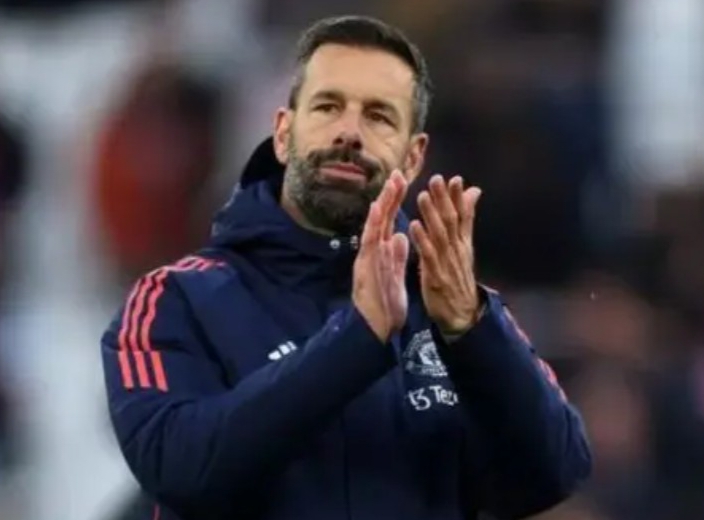
New Leicester City manager, Ruud van Nistelrooy, has shed light on his departure from Manchester United, expressing feelings of disappointment and hurt over how his exit unfolded.
The Dutchman, who stepped in as United’s interim manager after Erik ten Hag was sacked, has revealed he held an open and candid discussion with United’s new boss, Ruben Amorim, before his departure last month.
Van Nistelrooy explained that taking on the interim role was motivated by his deep connection with the club, its people, and its fans.
However, once Amorim arrived, the Portuguese manager opted not to include Van Nistelrooy in his coaching setup, a decision that left the former United striker disheartened.
“I stepped in as interim manager because I wanted to help the club during a difficult period,” Van Nistelrooy said.
“My intention was clear—I was there to assist United, and I was open to staying on in any capacity to continue that support.
So, when I was informed that I wouldn’t be part of the new coaching team, it was a tough pill to swallow.
I was disappointed, very much so, and it hurts.
”He added, “United is a club that means so much to me, and the bond I share with the fans and the people there is something I hold dear.
The only assistant managerial role I would have considered at this stage in my career was at United.
That’s why it stung even more to be shown the door.
”Despite his disappointment, Van Nistelrooy acknowledged the complexities of the situation, admitting that as a manager himself, he could understand Amorim’s perspective. “When I reflected on it, I got my head around the decision.
I understand that a new manager would want his own setup and might see my presence as a potential complication. It’s part of the job, and I respect that.
”Van Nistelrooy credited his conversation with Amorim for helping him move on. “I spoke to Ruben about it, man to man, manager to manager.
He was honest and respectful, and I’m grateful for that. It really helped me process everything and turn my focus to new opportunities.
”Shortly after his departure, Van Nistelrooy began discussions with Leicester City and was eventually appointed as their new manager.
The move, he said, has rejuvenated his spirits. “While leaving United hurt, the chance to take charge at Leicester City is an exciting new chapter for me, and I’m fully committed to making the most of it.
”As Van Nistelrooy transitions into his role at Leicester, his departure from United underscores the challenges even the most beloved figures face in football’s ever-evolving landscape.
News
Obasanjo would have died under Abacha if not for me -Gowon

Former Head of State, General Yakubu Gowon has narrated how former President Olusegun Obasanjo could have been killed for an alleged coup plot in 1995 under Gen. Sani Abacha if not for him.
Gowon said this at the maiden edition of the Interdenominational Unity Christmas Carol and Praise Festival organised by the Plateau Government.
The News Agency of Nigeria reports that Obasanjo was arrested in 1995 by General Sani Abacha and convicted of being part of a planned coup to overthrow his government.
Obasanjo, despite pleading innocent to the coup, was sentenced to death.
He spent three years in prison before he was released in 1998 following the death of Gen. Abacha on June 8 of that year.
While Gowon was the Special Guest of Honour at the event, Obasanjo was the Guest of Honour, respectively.
“I wrote a letter to Abacha, I pleaded with him that God made him a leader to do good and not evil.
“I sent my wife with the letter in the middle of the night to Abacha in Abuja; I pleaded with him that such a thing should not happen.
“I’m glad that soon after that, things changed, and not only that Obasanjo left prison, he became our president in 1999.
“This is something that only prayers and sincerity can do; I’m happy that today myself and Obasanjo are here to celebrate the unity of Plateau,” he said.
Gowon also thanked the state government for organising the carol, adding that it would further unite the citizens of the state.
The former head of state said that the state had gone through a myriad of security challenges. Hence, the carol provided a suitable avenue for the people to commune.
News
Why I don’t trust any public institution in Nigeria – Fisayo Soyombo
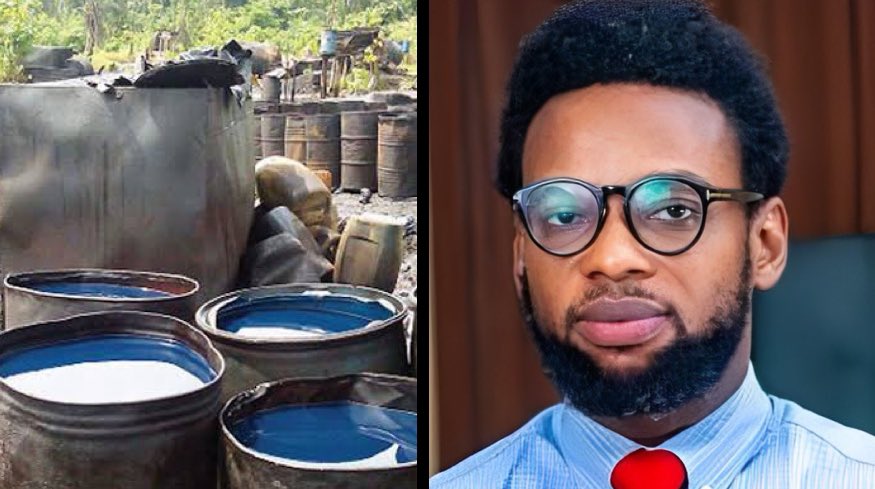
The founder of the Foundation for Investigative Journalism (FIJ), Fisayo Soyombo has revealed why he doesn’t trust any public institution in Nigeria.
Soyombo revealed this on Saturday during an interview on Arise Television, following his arrest and detention by the Nigerian Army for three days in Port Harcourt, Rivers State before he was released on Friday.
The investigative journalist explained that everything he told the army during interrogation was leaked to suspected oil thieves who also told him the exact things he said.
“How can you grill me at the 6 division and everything I told you, the illegal bunkerers were telling me. Every single thing,” he said.
“The real grouse of the army is that one, I did not carry them along. I would not deny that I have low trust for Nigerian public institutions.”
The FIJ founder added he does not trust any public institution in Nigeria dur to his ordeal investigating stories as an undercover journalist.
“A small two-minute diversion. Last year, I did an undercover investigation on an orphanage selling babies. I bought a new born baby for N2 million. I took the baby to NAPTIP, I looked after that baby,” he said.
“After I handed over the baby to NAPTIP, I sent a representative to go there every month. Her birthday, we bought a gift, Christmas same. We woke up one day and NAPTIP shut the door on us.”
The Nigerian Army had confirmed the arrest of the investigative journalist at an illegal oil bunkering site in the Niger Delta region.
The arrest, which sparked widespread concern and condemnation, occurred during an operation against oil theft and pipeline vandalism.
The confirmation followed public outcry over Soyombo’s detention, with the FIJ reporting on X (formerly Twitter) that Soyombo had been in Army custody for three days.
News
Minimum Wage: Cross Rivers Workers to embark on indefinite strike
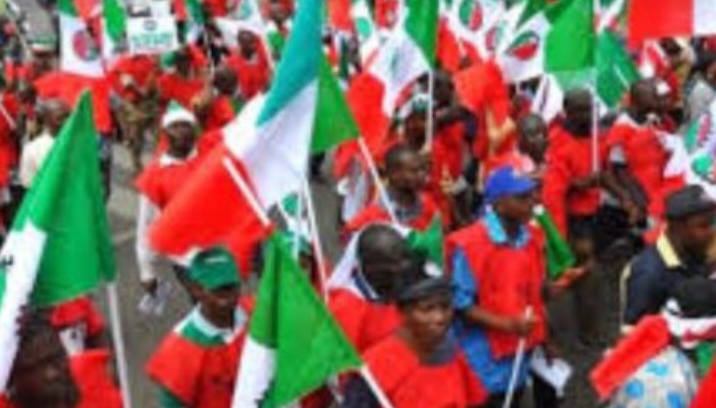
The organized labor unions in Cross River State have announced plans to embark on an industrial action due to the state government’s failure to implement the newly approved minimum wage of ₦70,000.
This decision was confirmed by the Chairman of the Trade Union Congress (TUC) in the state, Mr. Monday Ogbodum, on Saturday in Calabar.
According to Ogbodum, the Nigeria Labour Congress (NLC) has set a deadline for the strike to commence at midnight on Sunday if the state government fails to meet their demands.
Speaking on behalf of the labor unions, he emphasized that there would be no backing down on the industrial action unless the government promptly implements the new wage structure.
“Yes, we are still in talks with the government,” Ogbodum said. “We had a meeting on Thursday, followed by another on Friday that stretched into the late evening. Another meeting is scheduled for today (Saturday).
However, this does not mean that all is well. While the government has shown some seriousness in addressing our concerns, our position remains clear: even if we sign any document or agreement today, it does not equate to actual implementation.
“The TUC chairman further explained that negotiations are ongoing, but the unions are prepared to join the strike should the need arise.
He stressed that labor unions are seeking tangible actions and not just verbal commitments.
Labor unions in Cross River State, including the NLC and the TUC, have expressed their dissatisfaction over the prolonged delay in adopting the new minimum wage policy.
The ₦70,000 wage adjustment was introduced to provide relief for workers amidst rising inflation and economic challenges.
Despite the federal government’s endorsement of the policy, some states, including Cross River, have been slow to implement it, citing financial constraints.
Union leaders argue that the state government has had ample time to prepare for the policy’s implementation and should prioritize the welfare of its workers.
They have warned that any further delay will be met with decisive action, as workers are no longer willing to endure the economic hardships caused by inadequate wages.
The situation remains tense, with stakeholders closely monitoring the outcome of the ongoing discussions between labor representatives and the state government.
The unions have called on the government to act swiftly to prevent the strike, which could disrupt essential services across the state.
News
Bayer Leverkusen Forward Victor Boniface Faces Possible Sanction for Reckless Driving Incident
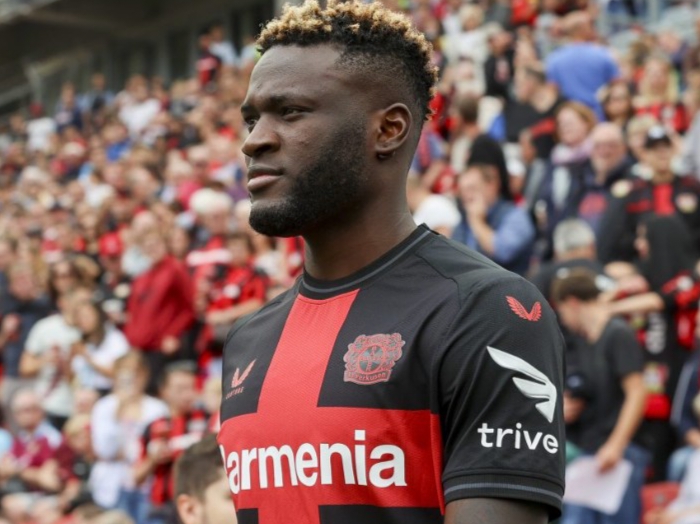
Bayer Leverkusen forward, Victor Boniface, has landed himself in hot water following allegations of reckless driving and mobile phone usage on a highway in Germany.
The Nigeria international reportedly posted a photo on social media that showed him scrolling through his phone while driving his Mercedes-Benz.
The 23-year-old’s actions have sparked widespread criticism, with fans and commentators expressing disappointment at what they described as irresponsible behavior.
The incident has not only drawn public backlash but has also caught the attention of his club, Bayer Leverkusen.
Manager Xabi Alonso has expressed his disapproval of the forward’s conduct, hinting at potential disciplinary action. Speaking to BeIN Sports, the former Real Madrid and Liverpool star did not mince words regarding Boniface’s behavior.
“I don’t like it; it’s obviously not good, and of course, it’s not allowed to happen,” Alonso stated firmly.
“I haven’t seen Boni [Boniface] yet, but he knows it’s not allowed. We have to tell him he’s not allowed to do something like this.
”The coach’s remarks reflect the club’s commitment to maintaining high standards of discipline and professionalism among its players.
Such actions, particularly those involving risky driving behavior, not only tarnish the image of the player but could also bring unwanted negative attention to the club.Boniface’s alleged use of his mobile phone while driving breaches both German traffic laws and the moral expectations placed on public figures like professional footballers.
In Germany, it is illegal to use a handheld device while driving, with violators facing fines and potential driving bans.
Additionally, as a role model to young fans worldwide, Boniface’s actions could set a harmful precedent if not addressed appropriately.Since joining Bayer Leverkusen, Boniface has been a key figure for the club, earning plaudits for his performances on the pitch.
However, this off-the-field controversy threatens to overshadow his accomplishments. Fans have taken to social media to express their concerns, with many urging the young striker to prioritize safety and uphold the values expected of a professional athlete.As the club investigates the incident, it remains to be seen what disciplinary measures will be taken.
For now, the focus is on ensuring that the message is clear: such behavior is unacceptable. The situation serves as a stark reminder of the responsibilities that come with fame and the importance of setting a positive example, both on and off the field.
News
PH refinery has not commenced bulk sales – NNPC

The Port Harcourt Refining Company (PHRC) has not yet commenced bulk sales or opened its purchase portal, as essential processes are still being finalised.
The Nigerian National Petroleum Company Limited (NNPC Ltd.) says an official announcements will be made if and when price reviews on the products occur.
Mr Olufemi Soneye, Chief Corporate Communications Officer, NNPC Ltd. in a statement on Friday, said currently its products being sold were originated from the Dangote Refinery.
The 60,000 barrels per day (bpd) capacity refinery began truck-out of petroleum products on Tuesday in Port Harcourt following its rehabilitation.
Some petroleum marketers and Nigerians have raised operational concern about the refinery as regards to pricing.
The Petroleum Products Retail Outlet Owners Association of Nigeria (PETROAN) also confirmed that the Refinery had not released any new price for products purchase.
The association said that it bought PMS with the old pricing template while awaiting the new prices.
“Currently, the products we are selling originate from the Dangote Refinery and include applicable Nigerian Midstream and Downstream Petroleum Regulatory Authority (NMDPRA) fees,” he said.
“Products from PHRC are exclusively for our retail stores at this stage. Our pricing is reviewed and adjusted periodically as necessary to reflect operational realities.
“We advise the public to disregard any misleading information regarding pricing. Official announcements will be made if and when price reviews occur,”.

2025: How To Plan A Budget For The Upcoming Year

Ruud van Nistelrooy Opens Up on Hurtful Manchester United Exit Before Taking Leicester City Job

Obasanjo would have died under Abacha if not for me -Gowon

Why I don’t trust any public institution in Nigeria – Fisayo Soyombo

Minimum Wage: Cross Rivers Workers to embark on indefinite strike

Bayer Leverkusen Forward Victor Boniface Faces Possible Sanction for Reckless Driving Incident

Radda approves N70,000 minimum wage for Katsina workers

PH refinery has not commenced bulk sales – NNPC

CBN issues Dec. 1, ultimatum against banks, ATM delays

